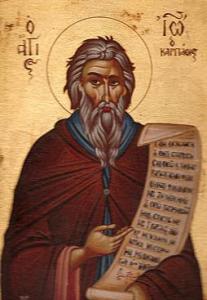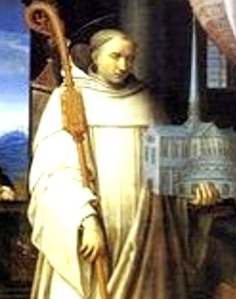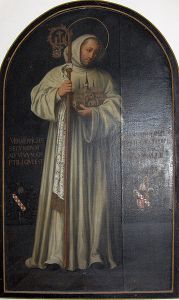![]() The feast of St Aidan, Enlightener of Northumbria, August 31st.
The feast of St Aidan, Enlightener of Northumbria, August 31st.
Aidan was in the king’s township…at the time when death caused him to quit the body, after he had been bishop sixteen years;
for having a church and a chamber in that place, he was wont often to go and stay there, and to make excursions from it to preach in the country round about, which he likewise did at other of the king’s townships, having nothing of his own besides his church and a few fields about it.
When he was sick they set up a tent for him against the wall at the west end of the church, and so it happened that he breathed his last, leaning against a buttress that was on the outside of the church to strengthen the wall.
[…] His body was. thence presently translated to the isle of Lindisfarne, and buried in the cemetery of the brethren.
Some time after, when a larger church was built there and dedicated in honour of the blessed prince of the Apostles, his bones were translated thither, and laid on the right side of the altar, with the respect due to so great a prelate. […]
It happened some years after, that Penda, king of the Mercians, coming into these parts with a hostile army, destroyed all he could with fire and sword, and the village where the bishop died, along with the church above mentioned, was burnt down;
but it fell out in a wonderful manner that the buttress against which he had been leaning when he died, could not be consumed by the fire which devoured all about it.
This miracle being noised abroad, the church was soon rebuilt in the same place, and that same buttress was set up on the outside, as it had been before, to strengthen the wall.
It happened again, some time after, that the village and likewise the church were carelessly burned down the second time. Then again, the fire could not touch the buttress; and, miraculously, though the fire broke through the very holes of the nails wherewith it was fixed to the building, yet it could do no hurt to the buttress itself.
When therefore the church was built there the third time, they did not, as before, place that buttress on the outside as a support of the building, but within the church, as a memorial of the miracle; where the people coming in might kneel, and implore the Divine mercy.
And it is well known that since then many have found grace and been healed in that same place, as also that by means of splinters cut off from the buttress, and put into water, many more have obtained a remedy for their own infirmities and those of their friends.
The Venerable Bede (672/4-735): Ecclesiastical History of England, 3, 17.












